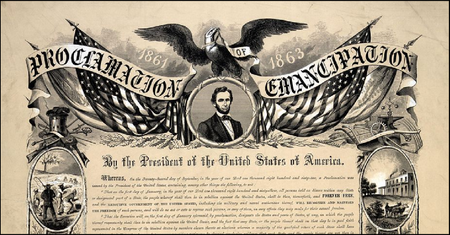President Abraham Lincoln signed his Emancipation Proclamation, freeing slaves, on January 1, 1863. However, many slaves remained in bondage as the Civil War raged on, as many refused to acknowledge the authority of Lincoln to do what he did.
General Robert E. Lee surrendered his southern army to General Ulysses S. Grant at the Appomattox Court House in Virginia on April 9, 1865, though Civil War hostilities actually continued up to 16 months following that surrender. Texas had not suffered as much as many of the southern states, and was last to reestablish a state government acknowledging the authority of the federal government. This occurred in August of 1866.
In the midst of all of this, on June 19, 1865, union soldiers arrived in Galveston, Texas, with news of the Emancipation Proclamation, and of Lee’s surrender at Appomattox. The arrival of this regiment enabled a gradual defeat of the resistance. This date became the oldest nationally celebrated commemoration of the ending of slavery in the United States. It is commonly referred to as Juneteenth.
The theme of slavery and emancipation has a spiritual analogue, as revealed in scripture.
Consider the words of Jesus, “Then Jesus said to those Jews who believed Him, ‘If you abide in My word, you are My disciples indeed. And you shall know the truth, and the truth shall make you free.’ They answered Him, ‘We are Abraham’s descendants, and have never been in bondage to anyone. How can You say, “You will be made free”?’ Jesus answered them, ‘Most assuredly, I say to you, whoever commits sin is a slave of sin. And a slave does not abide in the house forever, but a son abides forever. Therefore if the Son makes you free, you shall be free indeed'” (John 8:31-36).
Sin enslaves each of us. This bondage requires redemption. The word redemption means: a releasing or liberation effected by a payment of ransom. As each of us are enslaved by sin (cf. Romans 3:23), our freedom must be purchased. This is accomplished through the shed blood of our Savior, Jesus. Paul wrote that the church of God was “purchased with His [Jesus’] own blood” (Acts 20:28). The Holy Spirit serves as the guarantee of our ultimate reward until the time of “the redemption of the purchased possession” (Ephesians 1:14).
For the child of God, we are made free by the blood of the lamb. While the end of sin is death for the unbeliever, those who are obedient to the gospel of our Lord are freed from the consequence of that sin. “And having been perfected, He became the author of eternal salvation to all who obey Him” (Hebrews 5:9).
President Lincoln is rightly referred to as the great emancipator. In reading about the response of slaves to the news they received in June of 1865, I came across these quotes: “The reactions to this profound news ranged from pure shock to immediate jubilation.” And, as years continued, “The Juneteenth celebration was a time for reassuring each other, for praying and for gathering remaining family members. Juneteenth continued to be highly revered in Texas decades later, with many former slaves and descendants making an annual pilgrimage back to Galveston on this date.” (juneteenth.com/history.htm)
The Christian’s emancipation from the bondage of sin is a time for great rejoicing as well. Every Lord’s Day we have opportunity to remember the death of Jesus Christ, that act which bought our freedom from sin. It should be a time of reflection, and also a time of joy for us. We were in bondage, but now we are free.
“There is therefore now no condemnation to those who are in Christ Jesus, who do not walk according to the flesh, but according to the Spirit. For the law of the Spirit of life in Christ Jesus has made me free from the law of sin and death” (Romans 8:1-2).
Click below to…





